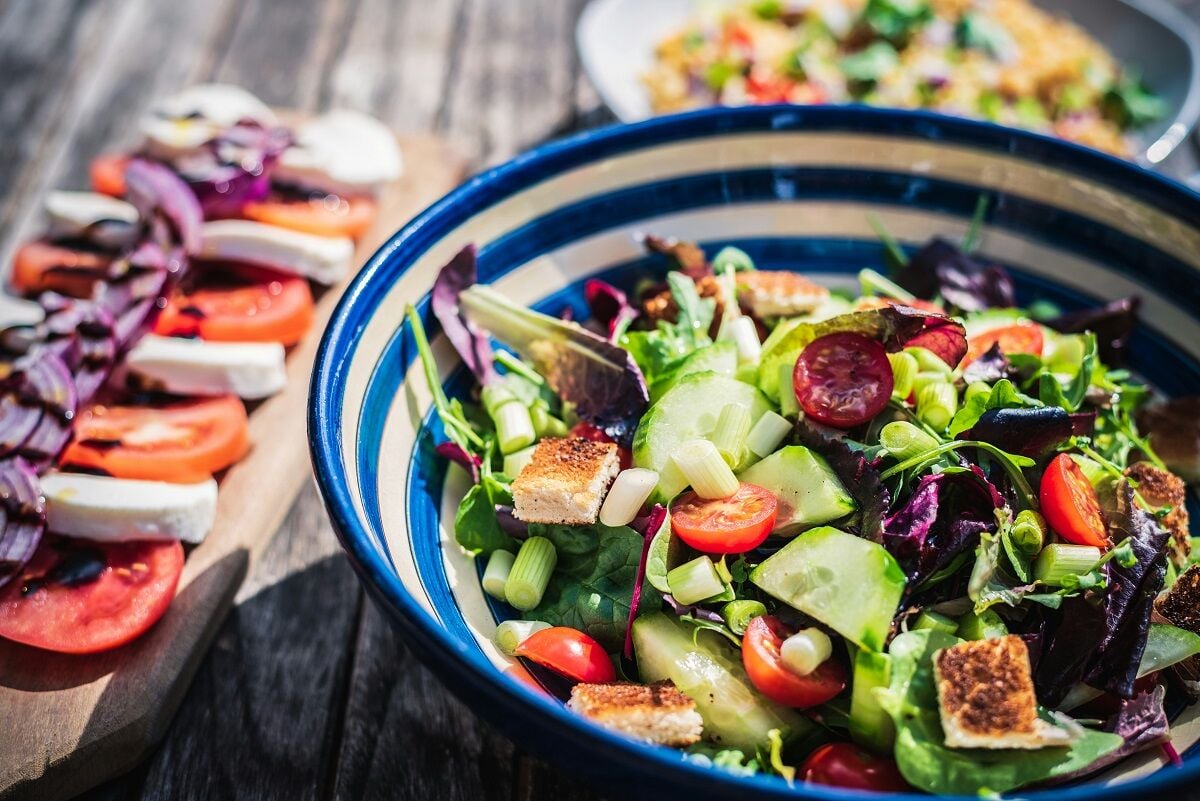How to create your balanced mediterranean diet plan

If you are seeking a dietary plan conducive to cardiovascular health, the Mediterranean diet could potentially be an appropriate selection. This diet merges essential elements of a healthy nutrition including the incorporation of olive oil and possibly even a glass of red wine. More significantly, its efficacy is substantiated by compelling scientific research. Evidence suggests that the Mediterranean diet not only enables weight loss but also assists in maintaining this reduced weight.
The Mediterranean diet surpasses simple dietary regulations, encapsulating a comprehensive lifestyle approach. Physical exercise and social engagement form integral parts of successful adherence to this regimen. Interestingly, the focus is not solely on the specific food items ingested but also on the manner of their consumption. Thus, we shall delve into the realm of the Mediterranean diet and discern how it can be customized to align with your lifestyle requirements and health objectives.
Remember that even minor modifications can generate substantial outcomes. Therefore, are you ready to commence your journey towards improved health and balance?
Understanding the Mediterranean diet
Shifting your eating pattern and embracing a balanced Mediterranean diet plan can offer multiple health rewards for you.
Key characteristics and health benefits
The distinguishing characteristics of the Mediterranean diet entail the consumption of fresh, unprocessed food items including fruits, vegetables, whole grains, and seafood, which subsequently lead to a multitude of health benefits. Contemporary research indicates that adherence to this dietary regimen may promote an anti-inflammatory effect in stark opposition to the pro-inflammatory Western diets.
The caveat is that more scientific research on this argument persists. Being a powerhouse of nutritious carbs and fats, the Mediterranean diet plays a pivotal role in weight management by promoting satiety, under an overall calorie-deficit scenario.
Core foods and nutrients
Your daily diet would encompass nutritious options like whole-wheat English muffins, almond butter, clementines, and snacks with ample fibre content like fruits, vegetables, or protein-packed options like yoghurt and nuts.
For example, a balanced Mediterranean 2000-calorie daily plan might look like breakfast with Cinnamon roll overnight oats and a whole-wheat English muffin with almond butter followed by a Veggie & Hummus Sandwich paired with a medium apple for lunch. You’d consume Stuffed Sweet Potato with Hummus Dressing as one of your daily meals too. Don’t forget the nutrition from your snacks – a dash of almond butter, nonfat plain Greek yoghurt or a few clementines would complement the Mediterranean platter quite well.
With its key focus on whole foods and nutrient-dense choices, transitioning to a Mediterranean diet is a recipe for a balanced, healthier lifestyle.
Designing your Mediterranean diet plan

Creating a balanced Mediterranean diet plan involves targeting nutritional goals and carefully structuring meals and snacks.
Setting nutritional goals
Embarking on the journey to establish your Mediterranean diet objectives is the initial phase in constructing an individualized plan. The renowned Mediterranean diet emphasizes heart-friendly foods that combat inflammation and are nutrient-dense. Essentially, what you should strive for is a dietary intake abundant in wholesome fruits, vegetables, whole grains, and seafood. A 2020 study revealed that individuals adhering to a Mediterranean diet exhibited twice the capability to maintain weight loss when compared to other groups. Therefore, if effective weight management is your goal, considering the Mediterranean diet could be a highly beneficial strategy.
Structuring meals and snacks
While nutrition is key, the timing of meals and the distribution of snacks throughout the day also play a vital role in forming your Mediterranean diet plan. Here’s an example of how to structure a 2000-calorie day:
Breakfast:
1 serving Cinnamon Roll Overnight Oats (191 calories)
1 whole wheat English muffin with 1 1/2 Tbsp almond butter
Snack:
1 clementine (45 calories)
Lunch:
1 serving Veggie & Hummus Sandwich, 1 medium apple
Snack:
2 Tbsp almond butter
Dinner:
1 serving Stuffed Sweet Potato with Hummus Dressing
These meals follow the Mediterranean focus on nutrient-dense and unprocessed foods, with cuisine variety for unique and satisfying flavours. It’s crucial to remember to include snacks throughout the day to prevent intense hunger and overeating during meal times. Having fibre-rich snacks like fruits or protein like yoghurt or nuts helps you feel satiated and support nutritional goals.
Implementing such nutritionally balanced and structurally sound meal plans, you can effectively adopt a Mediterranean diet, promoting healthier and more balanced consumption habits.
Shopping for the Mediterranean diet

Preparing for a balanced Mediterranean diet plan, your shopping journey plays a significant role. Choosing the right ingredients and keeping them stock-ready not only helps you adhere to the diet plan but also improves the overall dining experience. Let’s look at what essentials you should consider putting on your shopping list and some tips on choosing fresh and wholesome ingredients.
Essential grocery list
Planning a menu begins in the pantry. The Mediterranean diet relies on simple ingredients, many of which are commonly available at most grocery stores. Your shopping list might include fresh vegetables, leafy greens, wild-caught fish, or other seafood. Save this list and get started with your new diet journey.
Here’s an abbreviated list of noteworthy Mediterranean diet pantry items:
-
Extra virgin olive oil: One of the cornerstones of Mediterranean cuisine. It fits into a variety of dishes and adds a unique flavour.
-
Legumes: Includes beans, chickpeas, and lentils both dry and canned. These are nutrient-dense and offer a fantastic alternative for protein in vegetarian or vegan meals.
-
Grains and pastas: Including rice, brown rice, quinoa, farro, barley, bulgur, and couscous. These whole grains keep you satiated ensuring you get essential nutrients.
-
Nuts, seeds and dried fruits: Such as walnuts, almonds, hazelnuts, pistachios, and sesame seeds can all be excellent added to salads for crunch, or as a nutritious snack. Opt for unsalted versions to keep your sodium intake in check.
Remember to keep these in sealed containers to maintain freshness.
Tips for choosing fresh and wholesome ingredients
Choosing fresh and wholesome ingredients is paramount for a healthy meal. Here are a few guidelines:
-
Look for Seasonality: Embrace the seasons for purchasing fruits and vegetables. Seasonal produce is likely to be fresher and richer in nutrients.
-
Local means Fresh: Consider your local farmer’s markets for fresh produce and lean meats.
-
Grains and Legumes: Choose whole grain bread, pasta, and cereals over refined alternatives when possible. For legumes, while canned versions are fine, fresh or dried options often have fewer preservatives.
-
Avoid Processed Foods: The Mediterranean diet primarily includes foods in their original state or closest to it. Avoid foods with long ingredient lists and additional sugars.
Meal preparation strategies

When adhering to a Balanced Mediterranean Diet Plan, preparation isn’t only key, it’s integral. By incorporating the following strategies and suggestions, you’ll extract the most from your diet, both in terms of enjoyment and health benefits.
Weekly meal prep tips
Effective meal prep decreases stress around meal times, significantly reduces the chance of opting for unhealthy alternatives, and could also saves significant amounts of time each week. Start by planning your meals for the forthcoming week. Remember, the Mediterranean diet favours plant-based foods like fruits, vegetables, whole grains, legumes and nuts. Seafood and poultry play the role of primary protein sources, accented by dairy, eggs, and red meat sparingly.
Mark out those times when you’ll be eating at home, taking into account potential leftovers and how they could be used. With a plan in place, grocery shopping becomes highly focused, reducing waste and making sure you cover all nutritional requirements. Factor in cooking time for each meal. Heavier fares such as stews or roast vegetables require longer cooking, hence, best scheduled for when you’ve more time. On busier days, salads, fish or a quick stir-fry make for lighter, rapid meals.
Simple and nutritious recipe ideas
To inspire your Mediterranean culinary adventure, here are easy-to-prepare nutritious recipe ideas. A mixed legume salad combines various beans (recall our canned cannellini beans) with chopped red onion, celery, flat-leaf parsley, olive oil, salt, and pepper. Accented with a clove of crushed garlic, it makes for a quick, nutritious lunch or side dish.
For a hot meal, a salmon dish cooked with olive oil, cherry tomatoes, chopped anchovy fillets, and black olives provides essential omega fatty acids. Top with balsamic vinegar for added flavour. Serve it with the previously mentioned legume salad for a nutrient-packed meal.
Then, for a quick midday meal, the Tuna Olive Spinach Salad not only delivers a protein punch but also contributes to daily fibre intake. Partner it with a Pineapple Green Smoothie for a refreshing, light yet nutritious lunch.
Adapting the diet to fit your lifestyle

Adopting a Balanced Mediterranean diet plan into your lifestyle requires consideration of your personal dietary needs, preferences, and local availability of food. Let’s delve into how to incorporate local and seasonal foods into your dietary regimen and adapt the diet to suit different dietary needs.
Incorporating local and seasonal foods
A crucial component of the Mediterranean diet lies in its emphasis on fresh, local produce. Seasonal foods not only offer superior flavours but also boast peak nutritional value. Consuming local produce, such as fruits, vegetables or grains, supports your local economy and reduces the environmental impact of your diet.
Consider exploring farmers’ markets in your local area to source fresh, local ingredients. Remember to diversify your diet by incorporating various types of fruits, vegetables, legumes and whole grains available during each season. Let’s say, for instance, it’s the berry season. You could make a daily habit of consuming 3/4 cups of blackberries or raspberries, as suggested in the Mediterranean diet plan.
Variations for different dietary needs
While the Mediterranean diet possesses inherent flexibility, it may require further modifications to align with specific dietary requirements. Through these adjustments, the diet could be adapted more seamlessly to one’s lifestyle, facilitating a smooth transition that is effortless to sustain.
For instance, if you require a higher protein intake, your Mediterranean meal plan could incorporate lean chicken in recipes like Hasselback Caprese Chicken, which delivers a significant 77g of protein. Meanwhile, for a diet high in fibre, you might find the 1 1/2 cups of Roasted Fresh Green Beans with olive spinach Salad a fitting option. On the other hand, if reducing your daily caloric intake is the goal, a meal plan with a lower total of 1209 calories — like the one that includes Pineapple Green Smoothie and Dijon Salmon with Green Bean Pilaf— might be more apt.
Achieving your fitness goals has never been easier or more affordable, thanks to the latest advancements in wearable technology. These innovative devices provide real-time data, motivational insights, and convenient tracking features, making it simpler than ever to stay on top of your health and fitness journey without breaking the bank.

































